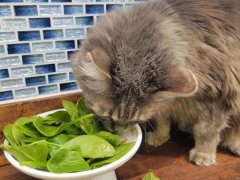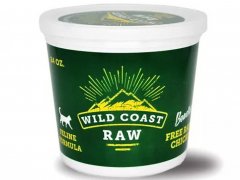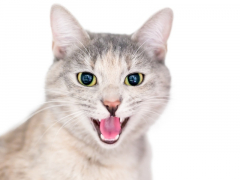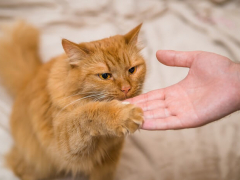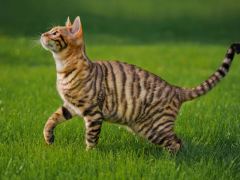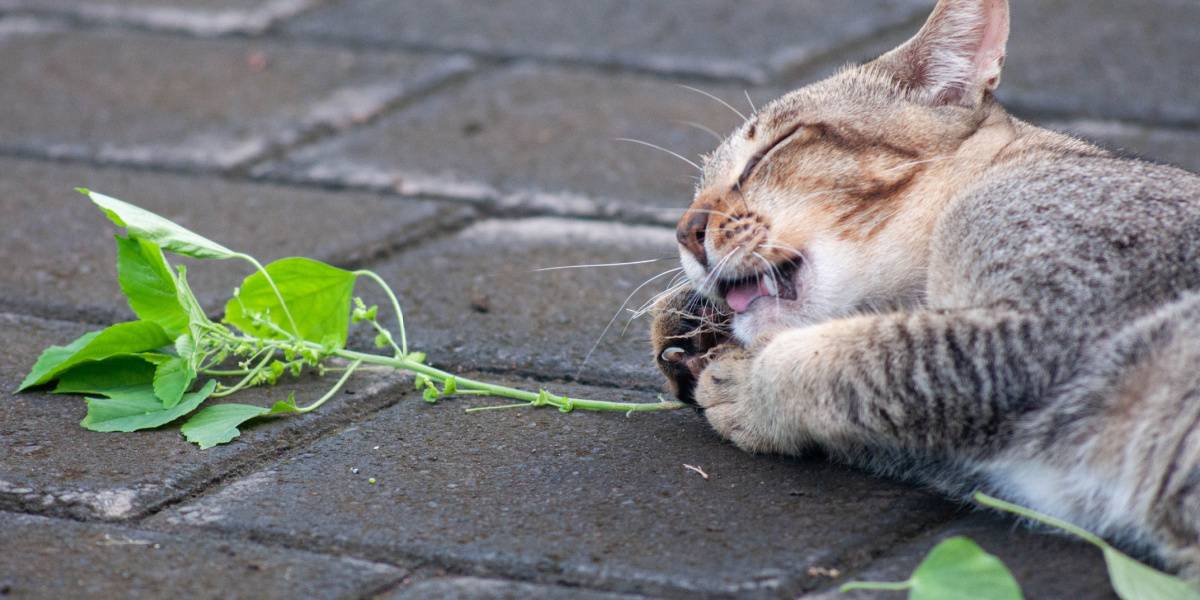
Shutterstock.com
Known as the “Japanese catnip,” silver vine is the super-charged alternative to catnip that you might have never heard of. It causes the same head-rubbing, rolling-over, purring euphoria as catnip but is more powerful and more popular too.
Despite catnip’s reputation, only two-thirds of cats actually respond to it. Whereas 80% of cats respond to silver vine—including 75% of the cats who didn’t respond to catnip. So if your cat isn’t a fan of catnip, there’s a good chance they will enjoy silver vine.
What Is Silver Vine for Cats?
Silver vine (Actinidia polygama) is a climbing plant that grows in mountainous regions of eastern Asia and Russia. It produces a type of kiwi fruit but actually gets its name from the beautiful silvery-white tips of its leaves.
Silver vine has been used in traditional Chinese and Japanese medicine for centuries to treat everything from inflammation to hypertension. But its remarkable effect on cats wasn’t recorded until 1704 by a Japanese botanist called E. Kaihara.
It became so popular that the response of cats to silver vine has been captured in Japanese art and history. A traditional Japanese painting dating back to 1859 shows a battle between cats and mice, where the mice are using silver vine to intoxicate the cats. To this day, it is one of the most popular cat treats in Asia.
However, because silver vine only grows in certain regions, it is tricky to manufacture commercially worldwide. Despite its advantages, this probably explains why silver vine is less well-known in Western countries than catnip. In fact, in 2017 a study on the responsiveness of cats to silver vine showed that 95% of veterinarians and 100% of veterinary technicians in the USA and Australia were unaware of silver vine and its effect on cats.
How Silver Vine Affects Cats
As a cat lover, you’re probably familiar with the catnip effect. Like catnip, the smell of silver vine triggers an immediate euphoria in cats which causes them to roll around on the floor, rubbing their heads, purring, and meowing. Whilst silver vine produces the same effects as catnip, it is generally more powerful.
Its effects are so characteristic that it is nicknamed the ‘Matatabi dance’ in Japan. Matatabi literally means “travel again” in Japanese. It is used as a nickname for silver vine as it causes cats to wiggle around on the ground!
So, why do certain plants trigger this euphoric state in cats? It all comes down to chemistry. When cats sniff the chemicals (allomones) released by plants like catnip and silver vine, it stimulates the sensory neurons in their noses.
This kick-starts a series of reactions that lead to a release of natural endorphins into your cat’s bloodstream. These endorphins act on the opioid receptors in the brain, causing the immediate feeling of euphoria and pleasure – like a natural high. But don’t worry, neither catnip nor silver vine is addictive.
We know that the major active ingredient in catnip is a substance called nepetalactone. However, research has found that silver vine contains not only nepetalactone but at least six other active compounds. This may explain why silver vine is not only more potent than catnip but also appeals to a greater variety of cats.
The only group of domestic cats who do seem to be immune to silver vine are kittens under eight months old and pregnant females. Nobody is exactly sure why this is.
Silver Vine vs Catnip
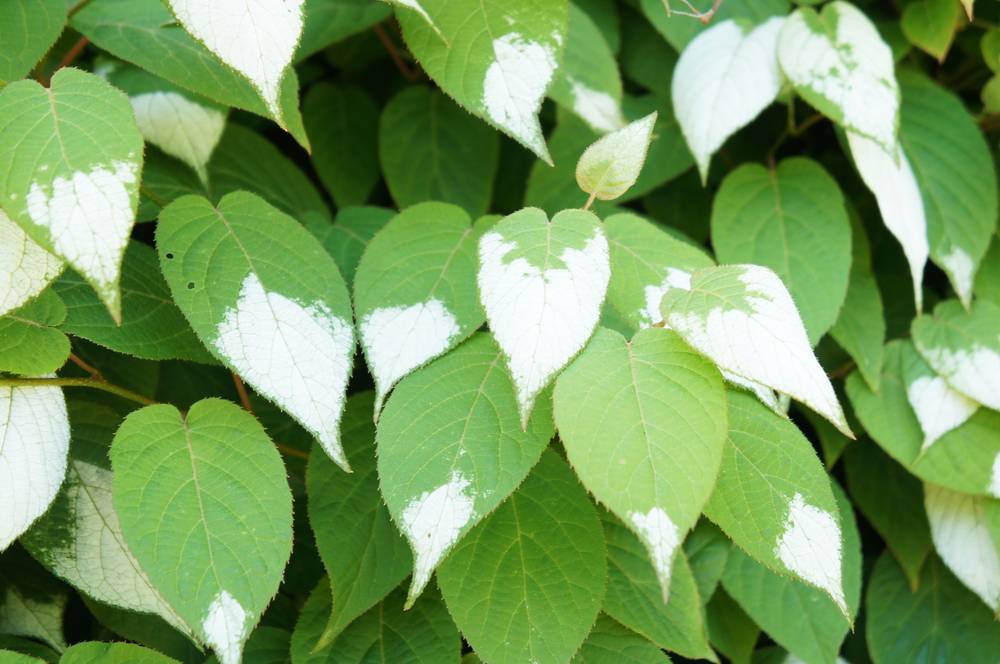
| Catnip | Silver Vine | |
| Scientific name | Nepeta cataria | Actinidia polygama |
| Grows in | Asia, Africa, Europe, USA | Mountainous regions of China, Japan, Korea, and Russia |
| Active components | Nepetalactol | Nepetalactone, actinidine, neonepetalactone, isoiridomyrmecin, iridomyrmecin, isodihydronepetalactone, and dihydronepetalactone |
| Responsiveness of cats | 68% | 80% (including 75% of the cats who do not respond to catnip) |
| Average length of effect | 5-15 minutes | 5–30 minutes |
| Effects | Excitement, playfulness, hyperactivity, purring, miaowing, head and chin rubbing, rolling over, drooling, sniffing, licking, running around, treading with hind legs | Excitement, euphoria, drooling, licking, sniffing, head rubbing, rolling on the ground, purring, meowing, playfulness, running around or treading with their hind legs. All these effects are stronger than with catnip. |
There are a few other plants that produce similar effects to catnip and silver vine. These include Tatarian honeysuckle (Lonicera tatarica) and valerian (Valeriana officinalis).
How to Use Silver Vine Sticks for Cats
You can find a range of silver vine products for cats in pet shops and online stores. According to studies, the most powerful form of silver vine is the powder produced by grinding the silver vine fruit galls – it’s also the form most cats respond to. So, if you’ve not tried silver vine before, silver vine powder is a good place to start. To use it, just rub a small amount of powder onto a toy or scratching post.
You can buy silver vine in a range of other formulations, from whole fruits to toys, sprays, and sticks. If your cat prefers the silver vine sticks, make sure you monitor them closely. Whilst the sticks are a great natural way to clean their teeth, fragments can break off and become a choking or obstruction risk.
The effects of silver vine usually only last for about half an hour. Over time some cats become less reactive to it. So, it’s a good idea to put silver vine toys away when your cat has finished with them and get them out every few days as a special treat.
The Benefits of Silver Vine
More than just a fun activity, research shows that stimulating your cat’s olfactory system (sense of smell) actually improves their well-being and reduces stress. When cats suffer from stress or boredom, it can lead to behavioral issues as well as physical diseases such as lower urinary tract disease and obesity. This is particularly true for cats who live indoors.
So, stimulating your cat’s amazing sense of smell with natural products like silver vine and catnip is a brilliant way to improve your cat’s well-being and keep them active. It might even reduce their risk of certain health conditions.
But silver vine has another unexpected health benefit for your cat – it protects them against insects! A recent study found that nepetalactone (found in both silver vine and catnip) is a natural insect repellent.
The authors write: “The rubbing and rolling response transfers nepetalactone from the plant leaves onto the cat’s face and head where it acts as a mosquito repellent, finally revealing the likely biological significance of this enigmatic feline behavior, first observed more than 300 years ago”.
So it’s possible that cats developed this euphoric response to certain plants to take advantage of the natural insect repellent!
Is Silver Vine Safe for Cats?
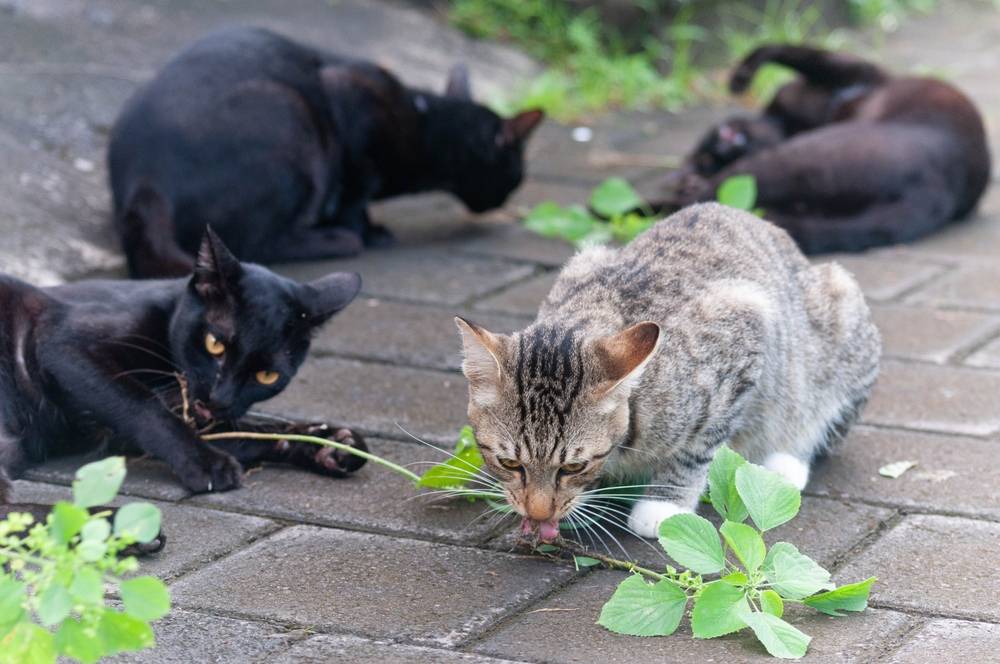
It’s clear that silver vine has the potential to offer you and your cat a lot of fun. It may even help boost their physical and mental health (and protect them against insects!). But the most important question you need to know is, is it safe?
Yes, the good news is that silver vine is very safe for cats. According to the Pet Poison Helpline and the Animal Poison Control Center, there have been no reports of toxicity or adverse reactions from silver vine in cats.
Importantly, research shows that despite offering an impressive high, it is not addictive. This is because silver vine triggers a release of natural endorphins. It is these natural endorphins that stimulate the opioid system, as opposed to external drugs like morphine which can be addictive.
The main risk to your cat from silver vine comes from chewing silver vine sticks. It is possible for small pieces to break off and cause damage if swallowed, or risk choking. So, be sure to monitor your cat carefully around silver vine sticks and throw away any fragments that break off.
Frequently Asked Questions
How much silver vine is safe for cats?
Silver vine is not toxic, so you can't really give your cat too much. However, you only need to use a small amount to produce an effect. You should follow the instructions on the packet, but it is usually about a quarter of a teaspoon of silver vine powder.
Is silver vine the same as catnip?
Whilst silver vine produces the same effect in cats, it is a completely different plant. Both silver vine and catnip contain the active ingredient nepetalactone, which is responsible for the euphoric effect. But silver vine also contains at least six other active substances, which explains why it is not only more powerful than catnip, but appeals to more cats.
Is silver vine good for cat teeth?
Chewing on silver vine sticks can help remove tartar and keep your cat's teeth clean. Just be sure to supervise your cat carefully and remove any small fragments that fall off as these could be dangerous for your cat to swallow.
How often can I give my cat silver vine?
As silver vine is not toxic, you won't harm your cat by giving it frequently. However, its effects only last for around 30 minutes, and some cats become less sensitive to it over time. Therefore, it usually works best to give it as a treat every few days and put it away after each use.
Is silver vine good for cat anxiety?
Yes. Cats often become anxious when they don't have enough environmental enrichment. Research shows that plants like silver vine can improve cat's well-being and reduce stress, particularly in indoor cats.

